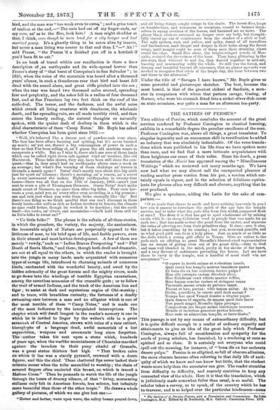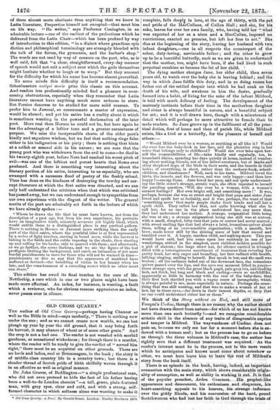THE SATIRES OF PERSIUS.*
THIS edition of Persius, which concludes the account of the great services rendered by Professor Conington to classical learning, exhibits in a remarkable degree the peculiar excellence of the man. Professor Conington was, above all things, a great translator. To singular ingenuity and an uncommon skill in versification he added an industry that was absolutely indomitable. Of the verse transla- tions which were published in his life-time we have spoken more than once, and we find that a more intimate acquaintance with them heightens our sense of their value. Since his death, a prose translation of the yEneid has appeared among the " Miscellaneous Writings " which we reviewed not many months ago. We have now had what we may almost call the unexpected pleasure of reading another prose version from his pen, a version which cer- tainly equals in vigour, and in the selection of felicitous equiva- lents for phrases often very difficult and obscure, anything that he ever produced.
We give a specimen, adding the Latin for the sake of com- parison:—
" 0 ye souls that cleave to earth and have nothin., heavenly in you t how can it answer to introduce the spirit of the ago into the temple service, and to infer what the gods like from this sinfall pampered flesh of ours? Tho flesh it is that has got to spoil wholesome oil by mixing cassia with it—to steep Calabrian wool in purple that was made for no such use ; that has made us tear the pearl from the oyster, and separate the veins of glowing ore from their primitive slag. It sins,—yea, it sins, bdt it takes something by its sinning ; but you, reverend pontiffs, tell us what good gold can do in a holy place. Just as much or as little as the dolls which a young girl offers to Venus. Give we rather to the gods such an offering as great Messalla's bleared-eyed representative has no means of giving even out of his great dish,--duty to God and man well blended in the mind, purity in the shrine of the hearty and a racy flavour of noblenesss pervading the bosom. Let me have- these to carry to the temple, and a handful of meal shall win me acceptance ":—
"0 earns in terris animas et e elestium Mauls, Quid juvat hos templis metros immittere mores Et bona dis ea hac scelerata ducere pulpa ? Hsc sibi corrupto cask= dissolvit olivo, Hsc Calabrum coxit vitiate murice vellns,
Hxc bacam conchs raaisse et stringere vonas
Ferventis masses crude de pnlvere
Peccat et Wee, peccat: vitio tameu utitar. At yes Dicite, pontifices, in smote quid facit anrum ?
Nempe hoc quod Veneri donats a virgins pups.
_ Quin damus id superis, de magna quod dare lance Non pessit magni Messallas lippa propago: Compositum jas fasciae ammo sanctosque recessus Mantis at incoctum generoso pectus honosto. Hwc cede ut admoveam templis, et farre-litabo."
This passage is not by any means of extraordinary difficulty, but it is quite difficult enough to a reader of ordinary capacity and attainments to give an idea of the great help which Professor Conington, always fall of consideration and sympathy for the needs of young scholars, has furnished, by a rendering at once so spirited and so close. it is certainly not everyone who could spell out the meaning, for instance, of "bona die ex bac scelerats ducere pulpa." Persius is so elliptical, so full of obscure allnsians, the more obscure because often referring to that daily life of anti'. quity of which we know and can know but little, that the student wants more help than the annotator can give. The reader stumble. from difficulty to difficulty, and scarcely contrives to keep any connected view of the whole. Here it is that the translation, which is judiciously made somewhat fuller than usual, is so useful. The scholar takes a survey, so to speak, of the country which he has to traverse, and is so helped over the particular hindrances—some • The Satires of d. Persius Flaecus, with a Translation and Commentary. By John Conington, M.A. Edited by H. liettleablp, M.A. Oxford: Clarendon Press. len.
of them almost more obstinate than anything that we know in Latin literature, Propertius himself not excepted—that meet him on his way. " He writes," says Professor Conington, in an admirable lecture—one of the earliest of the prelections which he delivered from the Latin Chair—which has been prefixed by way of introduction to this edition, "in a dialect where grandiose epic diction and philosophical terminology are strangely blended with the talk of the forum, the gymnasia, and the barber's shop." The words are not used by way of censure on the poet, who, as is well said, felt that "a clear, straightforward, every-day manner of speech would not suit a subject over which the gods themselves might hesitate whether to laugh or to weep." But they account for the difficulty for which his name has become almost proverbial.
To some minds this difficulty is itself a recommendation. Schoolmasters antigui moris prize this classic on this account. And readers less professionally minded find a pleasure in over- coming obstructions, especially when they remember that Latin literature cannot have anything much more arduous in store. But Persius deserves to be studied for more solid reasons. To prefer him to Juvenal, so consummate a master of expression, would be absurd; and yet his satire has a reality about it which is sometimes wanting in the powerful declamation of the later poet. More real than Horace he could not be, but here again he has the advantage of a loftier tone and a greater earnestness of purpose. We miss the inexpressible charm of the elder poet's kindly and sagacious wisdom, but we feel that nothing rings false either in his indignation or his piety ; there is nothing that hints at a selfish or sensual side in his nature ; we are sure that the young poet who was withdrawn from the evil to come—be died in his twenty-eighth year, before Nero had reached his worst pitch of evil—was one of the loftiest and purest hearts that Rome ever produced. And there is something very interesting about the literary portion of his satire, interesting to us especially, who are swamped with a nauseous flood of poetry of the fleshly school. Time has done us the kindness of destroying the tawdry and cor- rupt literature at which the first satire was directed, and we can only half understand the criticism when that which was criticised has passed away, but we can understand enough to sympathise from our own experience with the disgust of the writer. The general merits of the poet are admirably set forth in the lecture of which we have already spoken :—
" Where he draws the life that he must have known, not from the description of a past age, but from, his own experience, his portraits have an imaginative truth, minutely accurate yet highly ideal, which would entitle them to a distinguished place in any poetical gallery. There is nothing in Horace or Juvenal more striking than the early part of the third satire, where the youthful idler is at first represented by a series of light touches, snoring in broad noon, while the harvest is baking in the fields and the cattle reposing in the shade, then starting up and calling for his books, only to quarrel with them ; and afterwards, as we go further, the scene darkens, and we see the figure of the lost profligate blotting the background, and catch an intimation of yet more fearful punishments in store for those who will not be warned in time— punishments as dire as any that the oppressors of mankind have suffered or devised—the beholding of virtue in her beauty when too late, and the consciousness of a corroding secret which no other heart can share."
This edition has owed its final touches to the care of Mr. Nettleahip, a care which in one or two places might have been made more effectual. An index, for instance, is wanting, a fault which a reviewer, who for obvious reasons appreciates an index, never passes over in silence.



































 Previous page
Previous page